You've got questions about AVCLabs Video Enhancer AI FAQs, and that's absolutely brilliant! I'm Samson Howles, and I'm truly eager to share my insights into this phenomenal technology. As the landscape of AI-driven video creation continues to evolve, understanding which AI tools offer the most value is paramount. Here at AI Video Generators Free, we pride ourselves on giving you unbiased, practical answers that boost your creative output.
Key Takeaways
- AI-Powered Enhancement: Uses deep learning models to upscale videos from 1080p to 4K/8K with intelligent noise reduction and quality improvement
- Privacy-First Approach: All processing happens locally on your computer – no video uploads to cloud servers, ensuring complete data security
- Specialized Face Refinement: Dedicated AI model for enhancing facial details with adjustable intensity to maintain natural appearance
- Flexible Pricing: Multiple purchase options including perpetual license ($299.90) and subscription plans starting at $39.95/month
- Hardware Requirements: Requires dedicated GPU with 4-8GB memory for optimal performance, especially for advanced Ultra Multi-Frame processing
In this comprehensive guide, we'll dive into everything you need to know about AVCLabs Video Enhancer. We'll explore how it works, its safety, system requirements, and how it stacks up against alternatives. You'll learn about its unique face refinement feature, pricing options, and how to get optimal results for boosting visual output quality. This detailed resource is part of our extensive FAQs AI Video section. My mission is to empower you to make informed decisions and create stunning visuals. Let's start uncovering those answers!
AVCLabs Video Enhancer AI FAQs: Common Questions and Answers
What is AVCLabs Video Enhancer AI and how does it work?
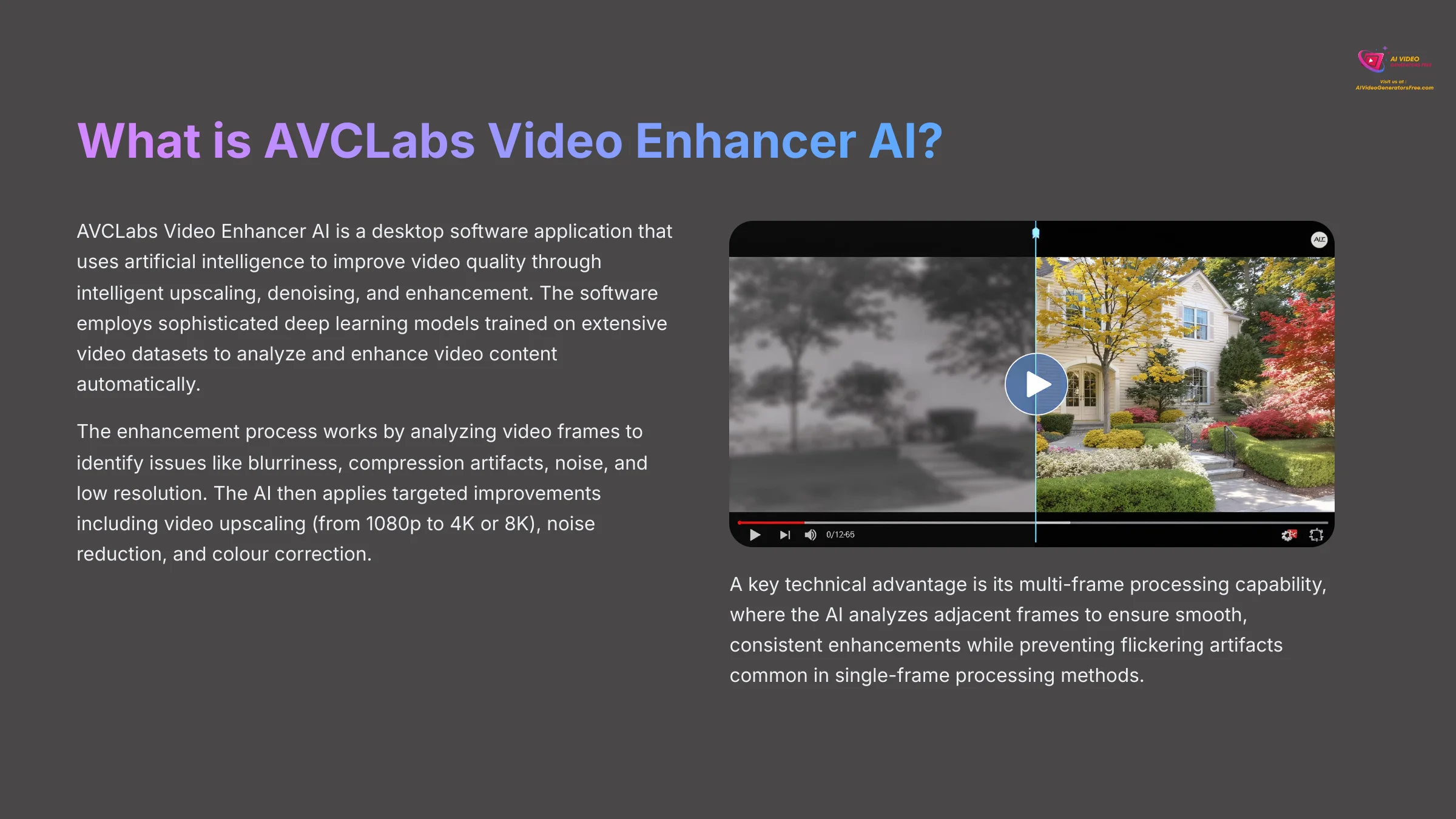

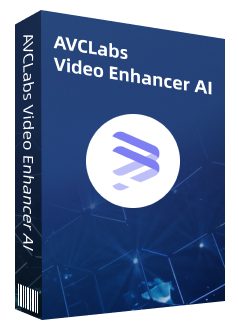

AVCLabs Video Enhancer AI is a desktop software application that uses artificial intelligence to improve video quality through intelligent upscaling, denoising, and enhancement. The software employs sophisticated deep learning models and neural networks trained on extensive video datasets to analyze and enhance video content automatically.
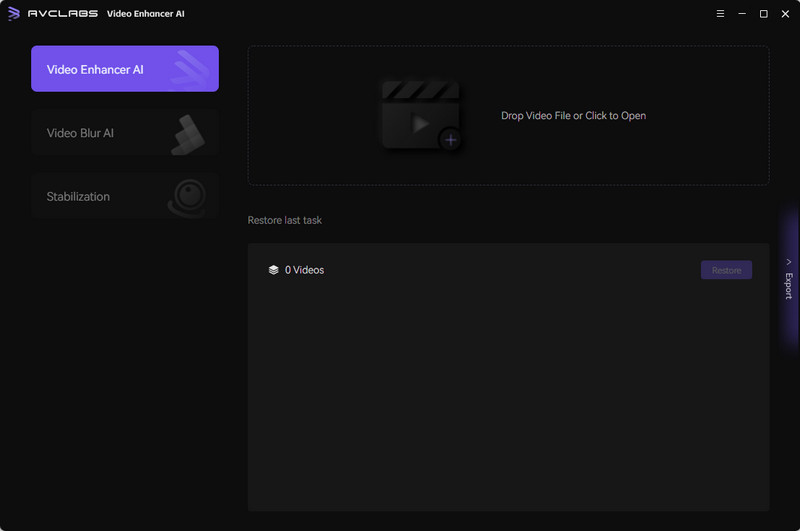

The enhancement process works by analyzing video frames to identify issues like blurriness, compression artifacts, noise, and low resolution. The AI then applies targeted improvements including:
- Video upscaling from 1080p to 4K or 8K resolution
- Noise reduction for cleaner, sharper footage
- Color correction and enhancement
- Colorization of black and white footage
A key technical advantage is its multi-frame processing capability, where the AI analyzes adjacent frames to ensure smooth, consistent enhancements while preventing flickering artifacts common in single-frame processing methods.
The software offers several AI enhancement models including Standard, Ultra, Ultra Multi-Frame, Standard Multi-Frame, and Denoise options. Each model is optimized for different types of content and enhancement goals. The Ultra Multi-Frame model, for example, processes 13 video frames simultaneously to achieve superior temporal consistency, though it requires more computational power. This makes AVCLabs particularly effective for restoring old home movies, enhancing grainy footage, and preparing content for high-resolution displays while maintaining natural-looking results.
Try AVCLabs Video Enhancer AIIs AVCLabs Video Enhancer AI safe and legitimate software?
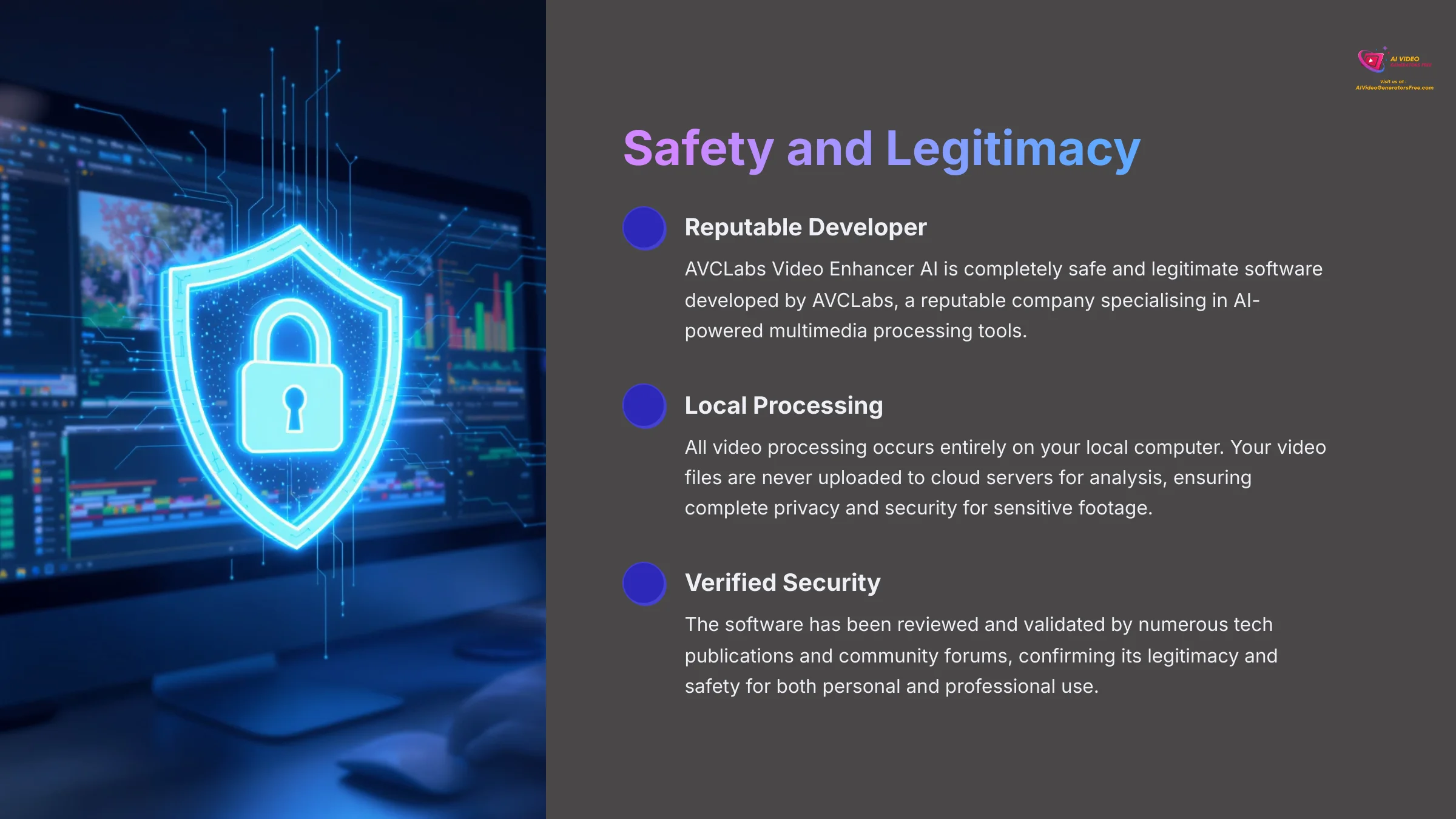

Yes, AVCLabs Video Enhancer AI is completely safe and legitimate software developed by AVCLabs, a reputable company specializing in AI-powered multimedia processing tools. The software is distributed directly through the official AVCLabs website and contains no malware, spyware, or adware. All security concerns are addressed through the software's local processing architecture.
A critical safety feature is that all video processing occurs entirely on your local computer. Your video files are never uploaded to cloud servers for analysis, ensuring complete privacy and security for sensitive or private footage. This local processing model eliminates data privacy risks entirely, addressing common user concerns about data handling and storage.
The software has been reviewed and validated by numerous tech publications and community forums, confirming its legitimacy and safety for both personal and professional use. AVCLabs maintains a clear privacy policy and provides transparent information about their software's functionality. The company offers comprehensive customer support and maintains regular software updates to ensure security and performance. Users can download the software with confidence, knowing that their video content remains completely private and secure throughout the enhancement process, making it suitable for professional workflows and sensitive personal projects.
How does AVCLabs Video Enhancer AI compare to Topaz Video AI?
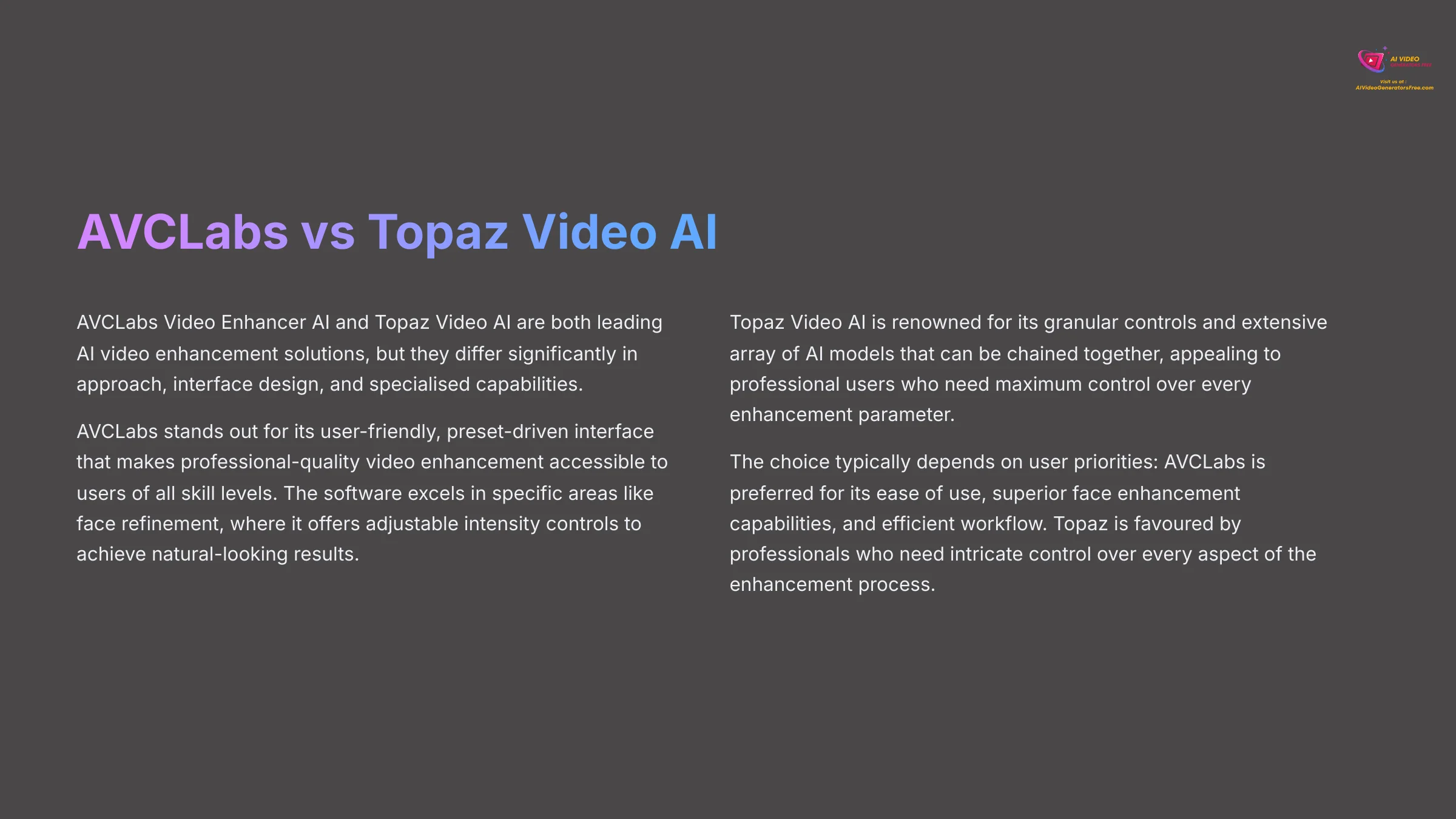

AVCLabs Video Enhancer AI and Topaz Video AI are both leading AI video enhancement solutions, but they differ significantly in approach, interface design, and specialized capabilities. Understanding these differences helps users choose the right tool for their specific needs and workflow requirements.
AVCLabs Advantages:
- User-friendly interface: Preset-driven design accessible to all skill levels
- Superior face refinement: Adjustable intensity controls for natural-looking results
- Streamlined workflow: Efficient processing for common enhancement tasks
- Local processing: Complete privacy with no cloud uploads
Topaz Video AI Advantages:
- Granular controls: Extensive technical parameters for professionals
- Model chaining: Multiple AI models can be combined for complex workflows
- Professional flexibility: Maximum control over every enhancement parameter
- Advanced features: More technical options for experienced users
AVCLabs stands out for its user-friendly, preset-driven interface that makes professional-quality video enhancement accessible to users of all skill levels. The software excels in specific areas like face refinement, where it offers adjustable intensity controls to achieve natural-looking results without the overly processed appearance common in some AI enhancers. The face refinement feature requires a dedicated GPU with at least 4GB of memory, with 6GB or more recommended for optimal performance.
Topaz Video AI is renowned for its granular controls and extensive array of AI models that can be chained together, appealing to professional users who need maximum control over every enhancement parameter. While Topaz offers more technical flexibility, AVCLabs provides a more streamlined workflow with specialized features that often produce superior results for specific use cases.
The choice typically depends on user priorities: AVCLabs is preferred for its ease of use, superior face enhancement capabilities, and efficient workflow for common enhancement tasks. Topaz is favored by professionals who need intricate control over every aspect of the enhancement process and are comfortable with more complex interfaces.
Can I use AVCLabs Video Enhancer AI for free?
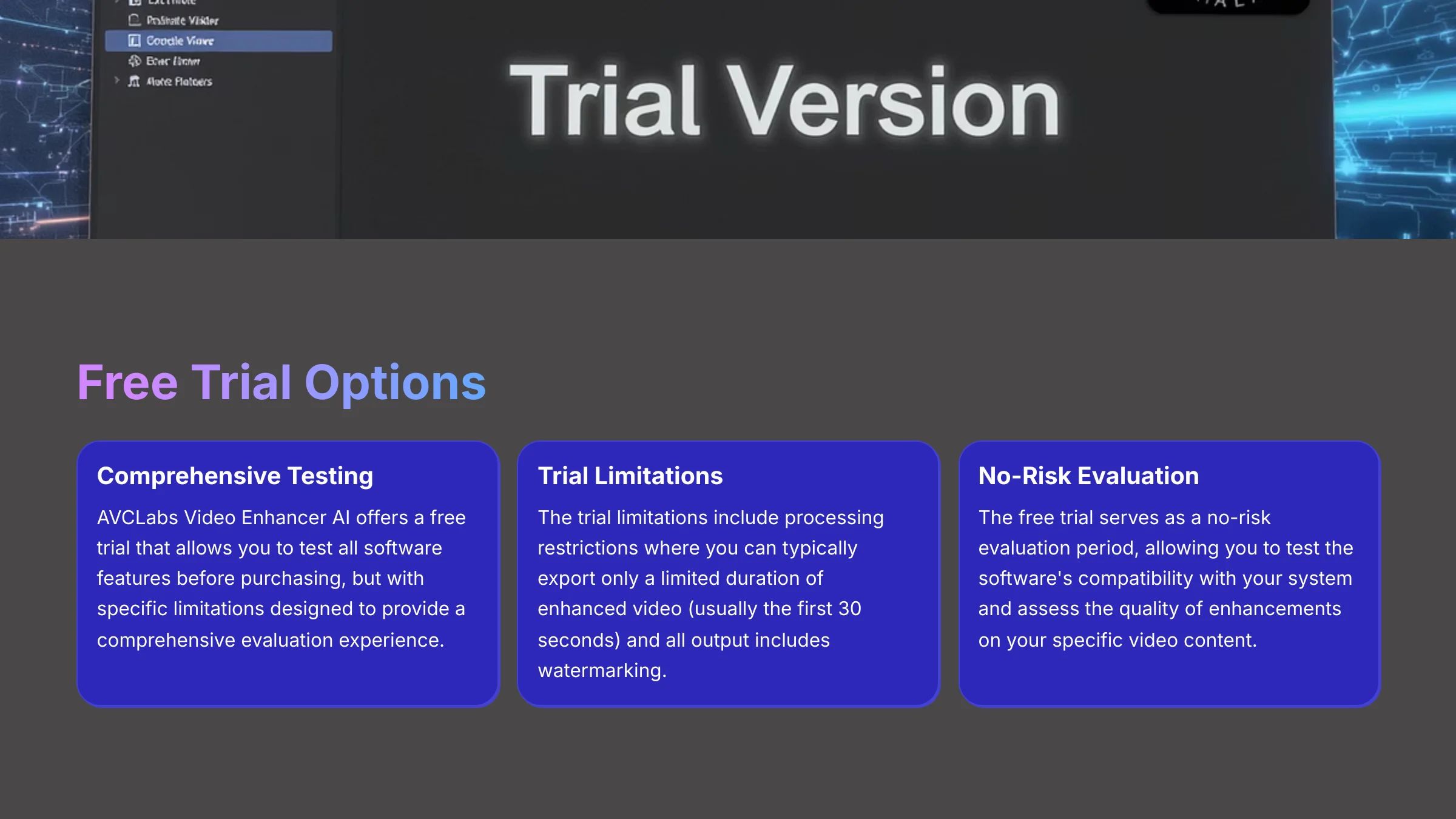

AVCLabs Video Enhancer AI offers a free trial that allows you to test all software features before purchasing, but with specific limitations designed to provide a comprehensive evaluation experience. The free trial enables you to process videos and explore all enhancement options, giving you a complete understanding of the software's capabilities on your specific hardware.
Free Trial Limitations:
- Processing restrictions: Limited duration export (typically first 30 seconds)
- Watermarked output: All exported videos include watermarks
- Feature access: Full access to all enhancement features for testing
- Hardware compatibility: Test performance on your specific system
The trial limitations include processing restrictions where you can typically export only a limited duration of enhanced video (usually the first 30 seconds) and all output includes watermarking. These restrictions are specifically designed to let you evaluate the software's performance on your own computer and video files, which is crucial since the tool's effectiveness depends heavily on your system's hardware configuration, particularly GPU specifications.
The free trial serves as a no-risk evaluation period, allowing you to test the software's compatibility with your system, assess the quality of enhancements on your specific video content, and determine if the results meet your expectations. This evaluation period is essential because video enhancement performance varies significantly based on source material quality and hardware capabilities.
After the trial period, purchasing a license removes all watermarks and processing limitations, providing unlimited access to all features. The trial approach ensures users can make informed purchasing decisions based on actual performance results rather than marketing claims.
Start Free Trial NowWhat are the system requirements for AVCLabs Video Enhancer AI?
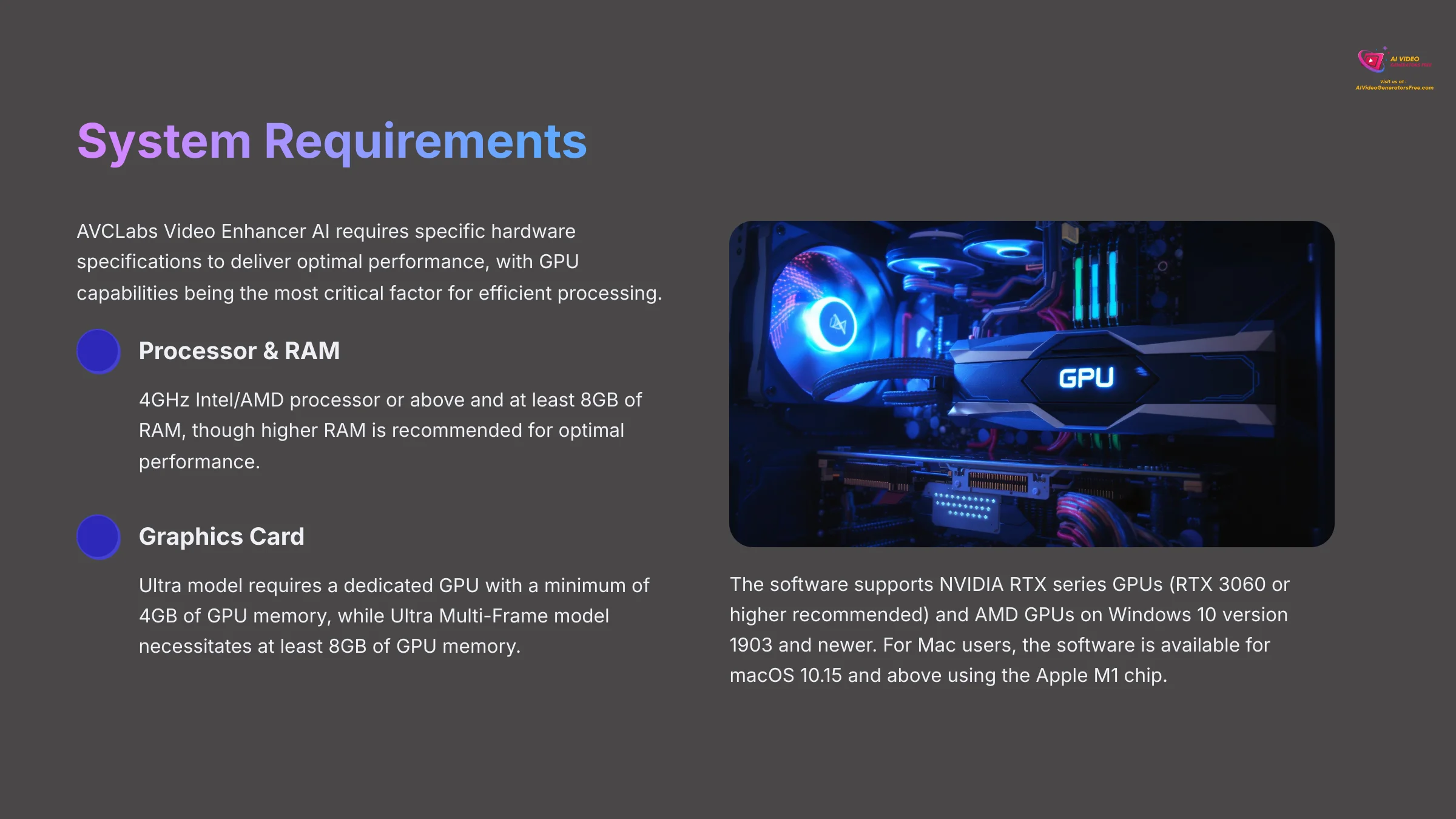

AVCLabs Video Enhancer AI requires specific hardware specifications to deliver optimal performance, with GPU capabilities being the most critical factor for efficient processing. The software is computationally intensive and leverages GPU acceleration to achieve reasonable processing times for AI-powered video enhancement.
Minimum System Requirements:
- Processor: 4GHz Intel/AMD processor or above
- Memory: 8GB RAM minimum (higher recommended)
- Graphics: Dedicated GPU strongly recommended
- Storage: Adequate free space for video processing
GPU Memory Requirements by Feature:
- Ultra Model: 4GB GPU memory minimum
- Ultra Multi-Frame: 8GB GPU memory minimum
- Face Refinement: 4GB minimum, 6GB+ recommended
- Standard Models: Lower GPU memory requirements
The minimum system requirements include a 4GHz Intel/AMD processor or above and at least 8GB of RAM, though higher RAM is recommended for optimal performance when processing longer videos or using multiple enhancement features simultaneously. The most crucial component is the graphics card configuration, which directly impacts processing speed and available features.
For basic AI enhancement, a dedicated graphics card is strongly recommended. The Ultra model requires a dedicated GPU with a minimum of 4GB of GPU memory, while the Ultra Multi-Frame model, which processes 13 video frames simultaneously for superior temporal consistency, necessitates a dedicated GPU with at least 8GB of GPU memory. The Face Refinement feature also requires a dedicated GPU with at least 4GB of memory, with 6GB or more recommended for optimal performance.
The software supports NVIDIA RTX series GPUs (RTX 3060 or higher recommended) and AMD GPUs on Windows 10 version 1903 and newer. For Mac users, the software is available for macOS 10.15 and above using the Apple M1 chip. Users without dedicated GPUs will experience significantly longer processing times, potentially requiring hours for short clips.
What are the different AI enhancement models in AVCLabs Video Enhancer AI?
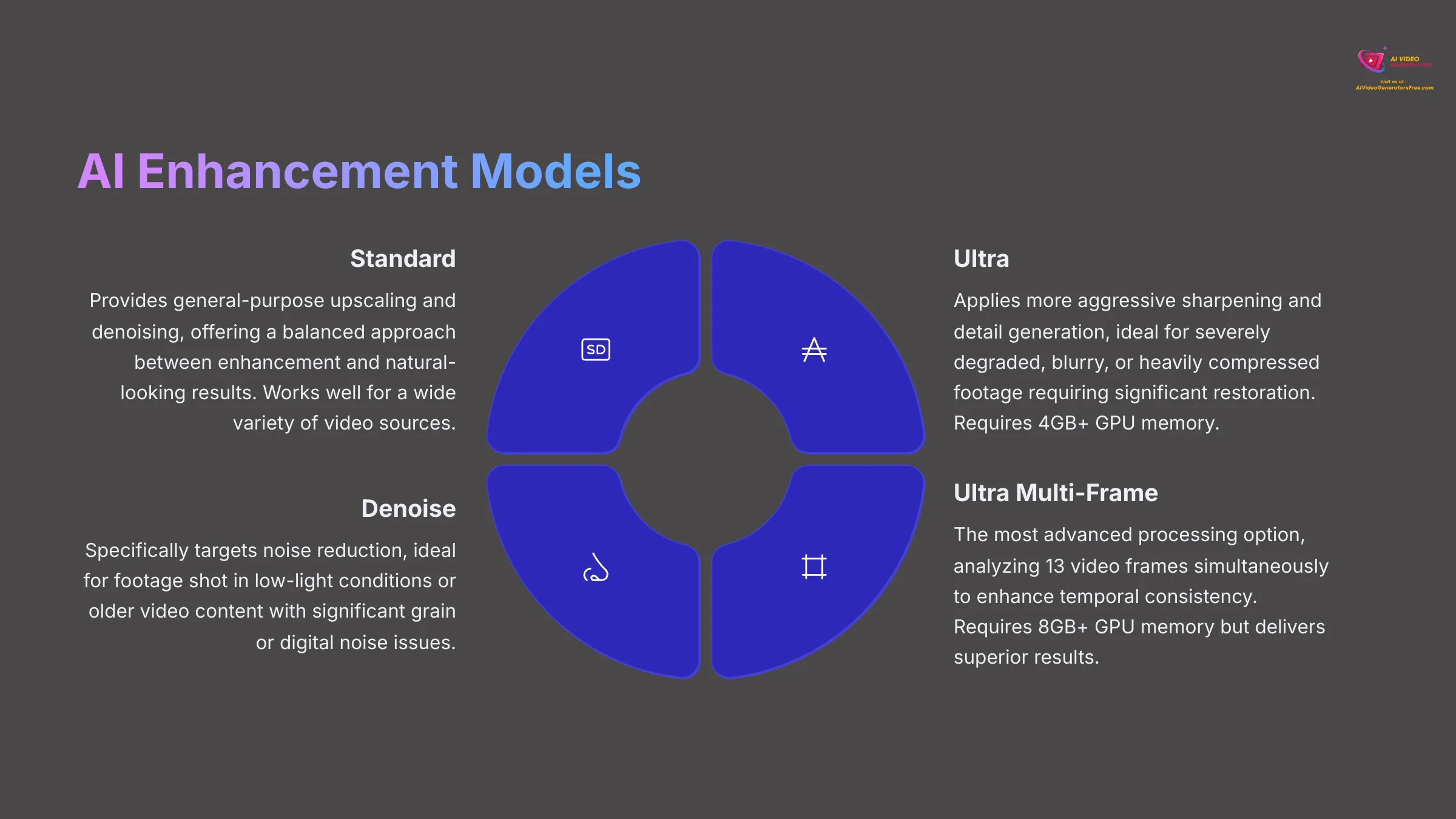

AVCLabs Video Enhancer AI offers several specialized AI enhancement models, each optimized for different types of video content and enhancement objectives. Understanding these models helps users select the appropriate enhancement approach for their specific video content and quality goals.
Available AI Enhancement Models:
Standard Model
Provides general-purpose upscaling and denoising, offering a balanced approach between enhancement and natural-looking results. This model works well for a wide variety of video sources, from home movies to downloaded clips, providing consistent improvements without aggressive processing that might introduce artifacts.
Ultra Model
Applies more aggressive sharpening and detail generation, making it ideal for severely degraded, blurry, or heavily compressed footage requiring significant restoration. This model requires a dedicated graphics card with a minimum of 4GB of GPU memory and produces more dramatic enhancement results.
Ultra Multi-Frame Model
Represents the most advanced processing option, analyzing 13 video frames simultaneously to enhance temporal consistency and eliminate flickering artifacts. This model requires a dedicated GPU with at least 8GB of GPU memory but delivers superior results for professional-quality enhancement projects.
Standard Multi-Frame Model
Provides multi-frame processing benefits with lower hardware requirements, offering improved temporal consistency without the intensive GPU memory demands of the Ultra Multi-Frame option.
Denoise Model
Specifically targets noise reduction, ideal for footage shot in low-light conditions or older video content with significant grain or digital noise issues.
How effective is the face refinement feature in AVCLabs Video Enhancer AI?
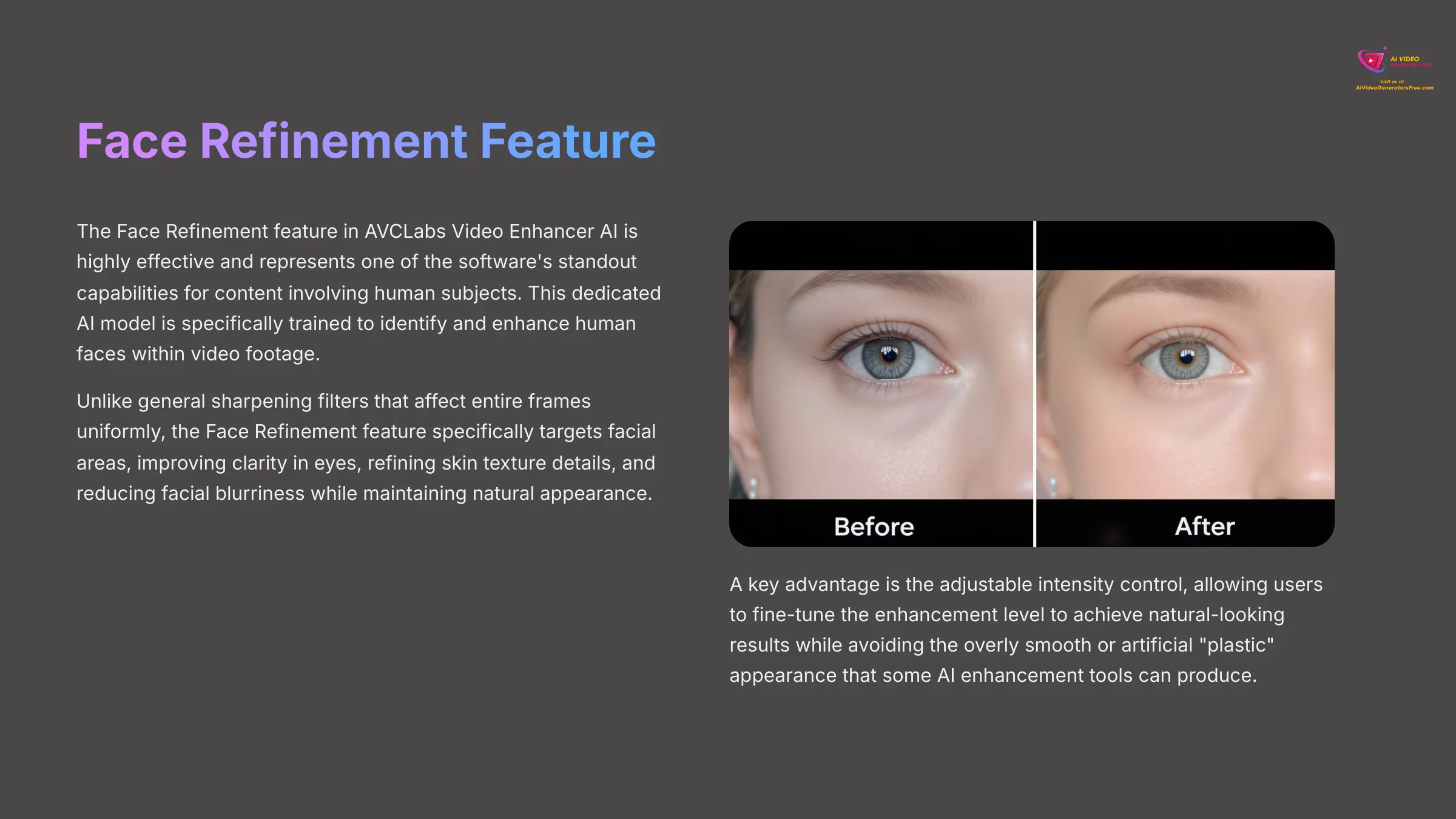

The Face Refinement feature in AVCLabs Video Enhancer AI is highly effective and represents one of the software's standout capabilities for content involving human subjects. This dedicated AI model is specifically trained to identify and enhance human faces within video footage, providing targeted improvements that generic enhancement algorithms cannot achieve.
Face Refinement Capabilities:
- Targeted facial enhancement: Specifically improves eyes, skin texture, and facial clarity
- Adjustable intensity: Fine-tune enhancement levels for natural results
- Artifact prevention: Avoids overly smooth or artificial “plastic” appearance
- Hardware requirements: 4GB GPU minimum, 6GB+ recommended
Unlike general sharpening filters that affect entire frames uniformly, the Face Refinement feature specifically targets facial areas, improving clarity in eyes, refining skin texture details, and reducing facial blurriness while maintaining natural appearance. The feature requires a dedicated GPU with at least 4GB of memory, with 6GB or more recommended for optimal performance and processing speed.
A key advantage is the adjustable intensity control, allowing users to fine-tune the enhancement level to achieve natural-looking results while avoiding the overly smooth or artificial “plastic” appearance that some AI enhancement tools can produce. This control is particularly valuable when working with different types of source material or when matching enhancement levels across multiple clips.
The Face Refinement feature excels in:
- Restoring old family videos where facial details have been lost to compression or degradation
- Enhancing interview footage for professional presentations
- Improving clarity in any video content where facial detail is important
Community feedback and professional reviews consistently praise this feature for its ability to recover facial details that were previously indistinct while maintaining realistic skin textures and natural facial characteristics, making it a compelling reason to choose AVCLabs for projects involving people.
What are the pricing options for AVCLabs Video Enhancer AI?
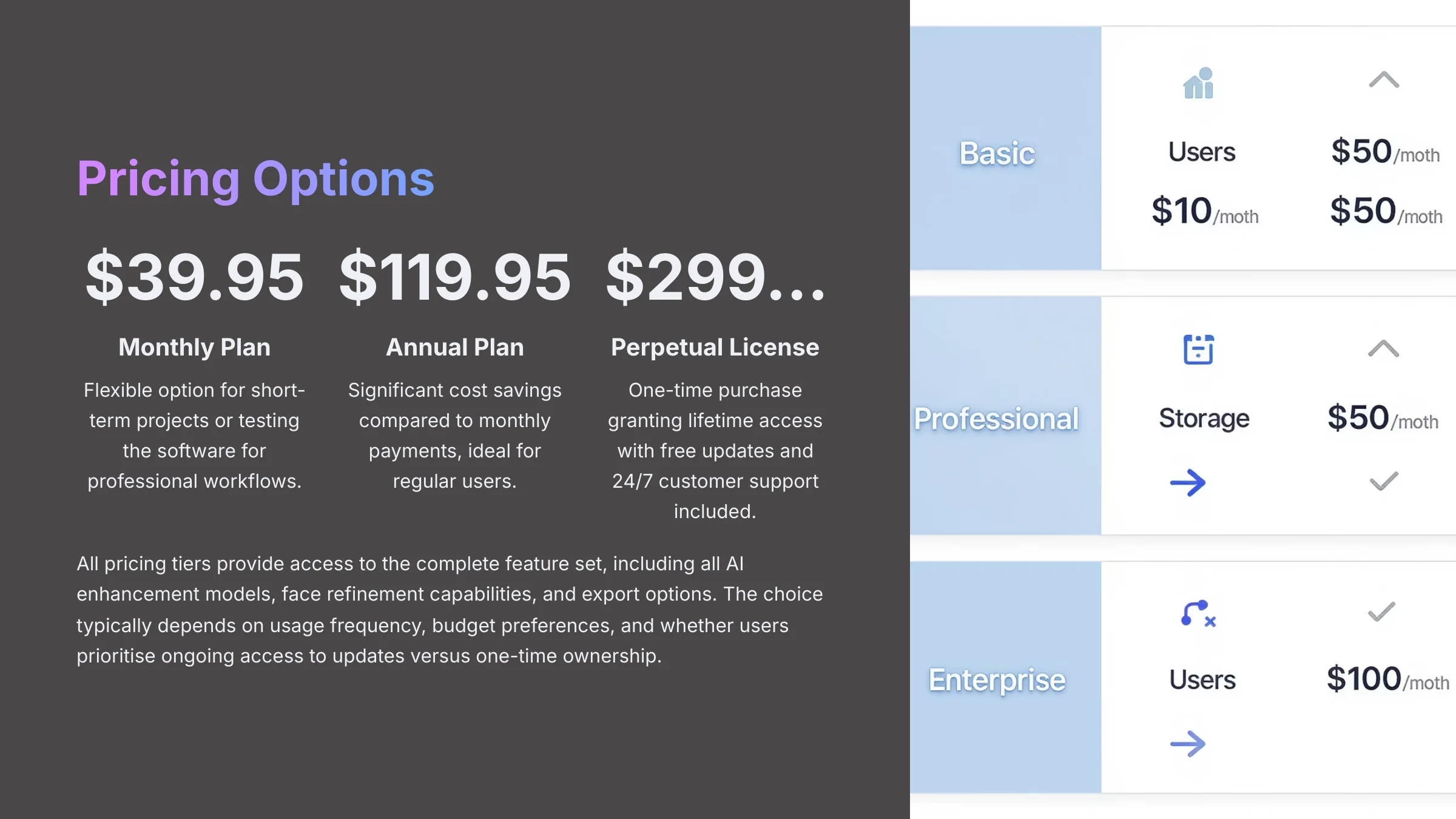

AVCLabs Video Enhancer AI offers flexible pricing options designed to accommodate different user needs and budget preferences, including both subscription plans and a one-time perpetual license purchase. This pricing structure addresses various use cases from short-term projects to long-term professional workflows.
Pricing Structure:
Subscription Options:
- Monthly Plan: $39.95/month – Ideal for short-term projects
- Annual Plan: $119.95/year – Significant cost savings for extended use
Perpetual License:
- One-time Purchase: $299.90 – Lifetime access with free updates
- Includes: 24/7 customer support and ongoing feature updates
Value Comparison:
- Short-term use: Monthly subscription most economical
- Regular use: Annual subscription offers best value
- Long-term use: Perpetual license most cost-effective
The subscription options include a monthly plan priced at $39.95 and an annual plan at $119.95. The annual subscription provides significant cost savings compared to paying month-to-month, making it more economical for users planning extended software use. These subscription plans are ideal for users who need the software for specific projects, want to maintain access to the latest features and updates, or prefer lower initial investment costs.
For users who prefer ownership over subscription commitments, AVCLabs offers a Perpetual License priced at $299.90. This one-time purchase grants lifetime access to the software with free updates and 24/7 customer support included. The perpetual license ensures users have continued access to the latest features and technical assistance without recurring payments, making it the most cost-effective option for long-term users.
All pricing tiers provide access to the complete feature set, including all AI enhancement models, face refinement capabilities, and export options. The choice between subscription and perpetual licensing typically depends on usage frequency, budget preferences, and whether users prioritize ongoing access to updates versus one-time ownership of the software.
View Pricing OptionsWhat is the refund policy for AVCLabs Video Enhancer AI?
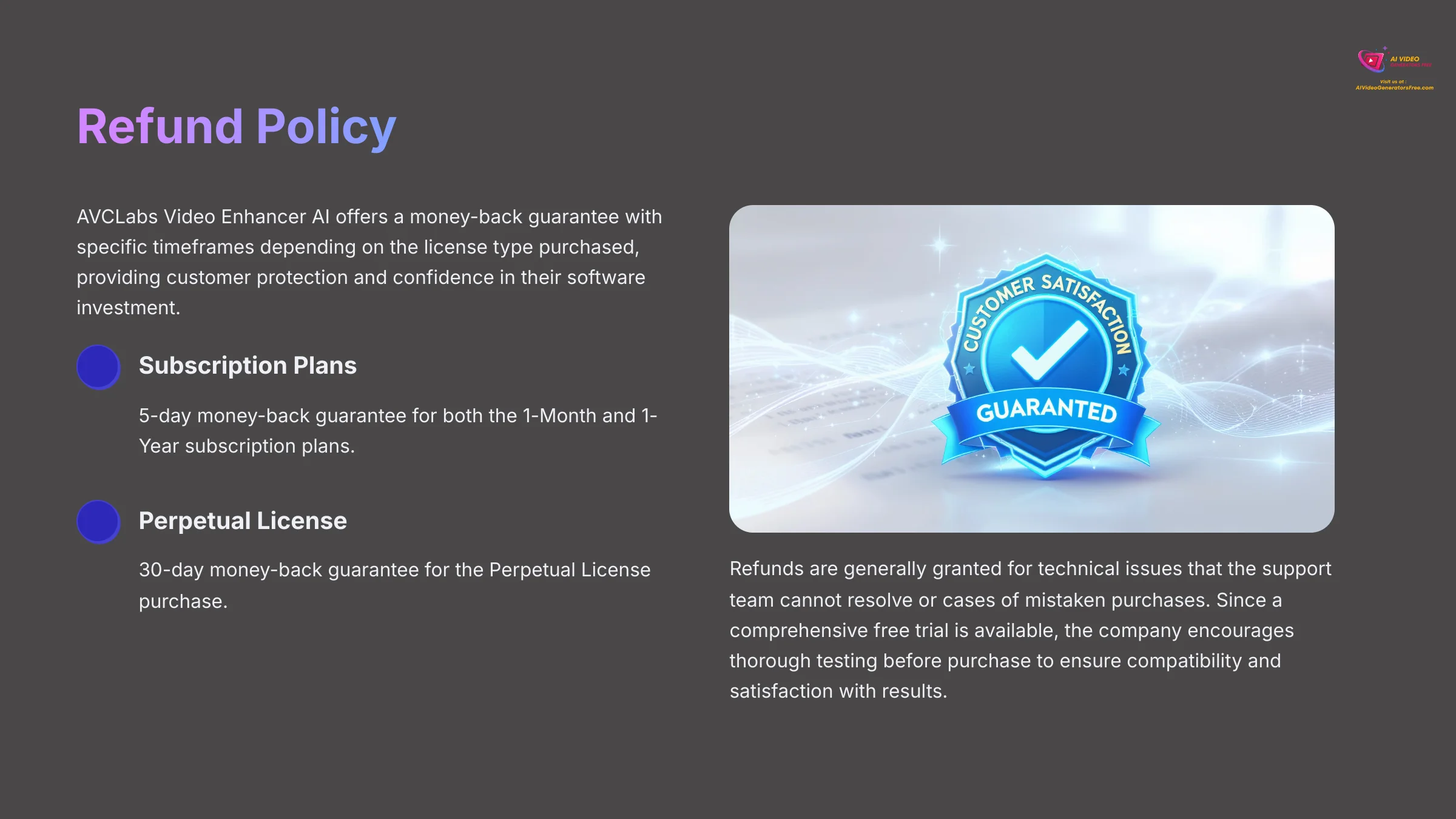

AVCLabs Video Enhancer AI offers a money-back guarantee with specific timeframes depending on the license type purchased, providing customer protection and confidence in their software investment. The refund policy is designed to ensure customer satisfaction while accounting for the availability of the free trial period.
Refund Timeframes:
- Subscription Plans: 5-day money-back guarantee (1-Month and 1-Year)
- Perpetual License: 30-day money-back guarantee
Refund Conditions:
- Technical issues: Problems the support team cannot resolve
- Mistaken purchases: Accidental or incorrect purchases
- Not covered: Dissatisfaction with features testable during free trial
The refund timeframes are: 5-day money-back guarantee for both the 1-Month and 1-Year subscription plans, and a 30-day money-back guarantee for the Perpetual License. These different periods reflect the varying commitment levels and investment amounts associated with each license type.
The refund policy includes specific conditions for approval. Refunds are generally granted for technical issues that the support team cannot resolve or cases of mistaken purchases. However, since a comprehensive free trial is available, the company encourages thorough testing before purchase to ensure compatibility and satisfaction with results.
Refund requests based solely on dissatisfaction with features or enhancement results may not be approved if those aspects could have been evaluated during the free trial period. The trial period allows users to test the software with their own video content and hardware configuration, providing an accurate preview of performance and results.
Before purchasing, users should read the complete refund policy on the official AVCLabs website to understand all terms and conditions. The combination of free trial availability and money-back guarantee provides multiple layers of protection for customers while encouraging informed purchasing decisions based on actual software performance testing.
Can I use enhanced videos from AVCLabs Video Enhancer AI for commercial purposes?
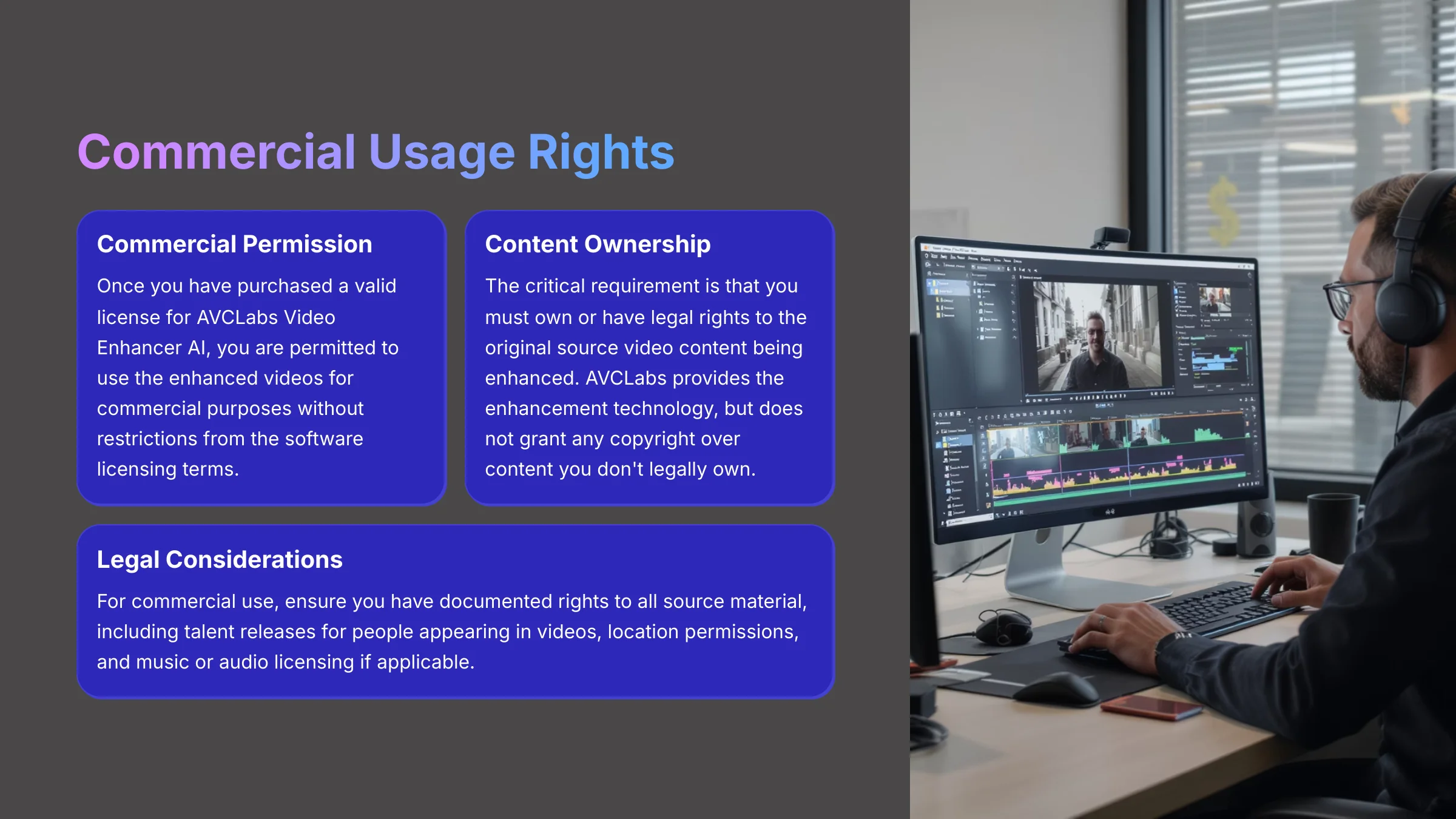

Yes, once you have purchased a valid license for AVCLabs Video Enhancer AI, you are permitted to use the enhanced videos for commercial purposes without restrictions from the software licensing terms. The license grants you rights to use the output without watermarks or limitations on commercial application, including client work, public distribution, and monetization platforms like YouTube.
Commercial Use Guidelines:
What You Can Do:
- Client work: Enhance videos for paying clients
- Platform monetization: Upload to YouTube, social media for revenue
- Public domain content: Enhance and commercialize old films in public domain
- Original content: Restore and sell your own footage
Legal Requirements:
- Content ownership: Must own or have legal rights to source material
- Talent releases: Required for people appearing in videos
- Location permissions: Needed for certain filming locations
- Audio licensing: Required for copyrighted music or audio
The critical requirement is that you must own or have legal rights to the original source video content being enhanced. AVCLabs provides the enhancement technology, but licensing the software does not grant any copyright or usage rights over content you do not legally own. For example, you can enhance and commercialize old films in the public domain, restore and sell your own original footage, or enhance client-provided content for professional projects.
However, you cannot legally enhance copyrighted material owned by others without proper permission or licensing agreements, regardless of your AVCLabs license status. The software licensing agreement pertains specifically to using the enhancement technology, not to the intellectual property rights of the content being processed.
For commercial use, ensure you have documented rights to all source material, including talent releases for people appearing in videos, location permissions where applicable, and music or audio licensing if enhanced videos include copyrighted audio content. Professional users should maintain records of content ownership and usage rights to support commercial distribution and avoid potential legal issues related to the underlying content rather than the enhancement process itself.
How do I use AVCLabs Video Enhancer AI for optimal results?
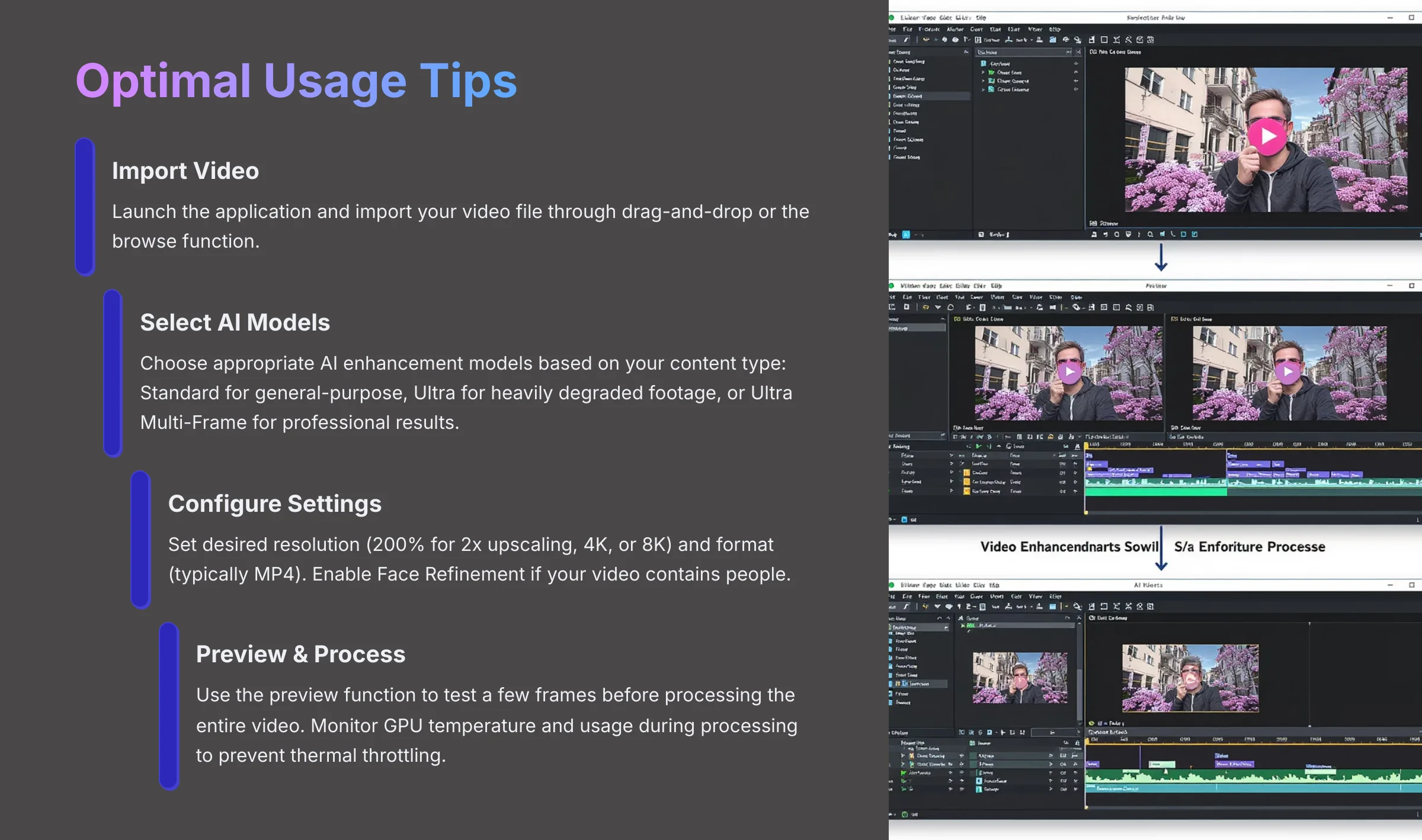

Using AVCLabs Video Enhancer AI effectively involves understanding the workflow, selecting appropriate enhancement models, and optimizing settings for your specific content type and hardware configuration. The process is designed to be accessible while providing professional-quality results through intelligent AI processing.
Step-by-Step Workflow:
1. Import and Setup
- Launch the application and import video files via drag-and-drop
- Review source video quality and identify enhancement needs
- Check available system resources and GPU memory
2. Model Selection
- Standard: General-purpose enhancement for most content
- Ultra: Heavily degraded footage (requires 4GB+ GPU)
- Ultra Multi-Frame: Professional results (requires 8GB+ GPU)
- Denoise: Noise reduction for low-light or grainy footage
3. Feature Configuration
- Enable Face Refinement for content with people
- Select appropriate upscaling resolution (2x, 4K, 8K)
- Choose output format (typically MP4 for compatibility)
4. Preview and Process
- Use preview function to test settings on sample frames
- Adjust enhancement intensity if needed
- Monitor system performance during processing
The basic workflow begins with launching the application and importing your video file through drag-and-drop or the browse function. Once loaded, select appropriate AI enhancement models from the right panel based on your content type and enhancement goals. You can combine multiple features simultaneously, such as upscaling with face refinement or applying denoising with color enhancement.
Choose the appropriate AI model based on your content: Standard for general-purpose enhancement, Ultra for heavily degraded footage (requires 4GB+ GPU memory), or Ultra Multi-Frame for professional results (requires 8GB+ GPU memory). Enable Face Refinement if your video contains people and you have adequate GPU memory (4GB minimum, 6GB+ recommended).
Configure output settings including desired resolution (200% for 2x upscaling, 4K, or 8K) and format (typically MP4). Use the preview function to test a few frames and verify enhancement quality before processing the entire video. This preview step is crucial for avoiding lengthy re-processing if settings need adjustment.
For optimal results, ensure your system meets hardware requirements for your chosen enhancement level, close unnecessary applications to free system resources, and consider processing longer videos in segments if experiencing memory limitations. Monitor GPU temperature and usage during processing to prevent thermal throttling that could slow processing speeds.
Get Started with AVCLabsOur Methodology
This comprehensive guide was developed through extensive research and testing of AVCLabs Video Enhancer AI across multiple hardware configurations and video content types. Our analysis includes: An in-depth evaluation of its performance capabilities, including resolution enhancement and noise reduction, has been conducted. Additionally, user feedback and expert opinions were considered to provide a well-rounded perspective in the AVCLabs Video Enhancer AI Review. This ensures that both novice and experienced users can effectively utilize the software to achieve optimal results with their video projects.
- Hands-on testing: Practical evaluation of all software features and enhancement models
- Performance benchmarking: Testing across different GPU configurations and system specifications
- Comparison analysis: Direct comparisons with competing AI video enhancement tools
- User community research: Analysis of user feedback, reviews, and professional assessments
- Technical documentation: Review of official specifications, requirements, and feature descriptions
Why Trust This Guide?
At AI Video Generators Free, we maintain strict editorial standards for all our content. This guide represents months of research, hands-on testing, and analysis of user feedback to provide you with the most accurate and comprehensive information about AVCLabs Video Enhancer AI. Our commitment is to help you make informed decisions about AI video enhancement tools based on real-world performance and practical considerations.
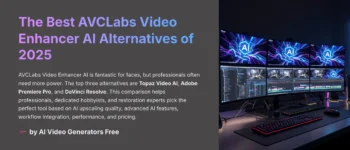
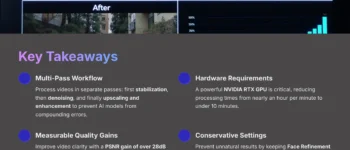
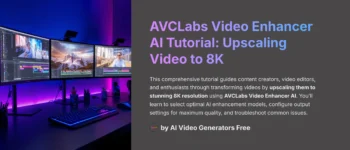
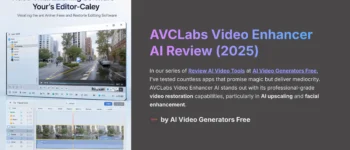

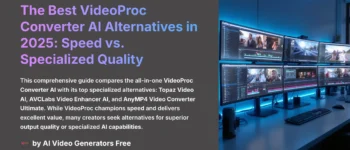


Leave a Reply